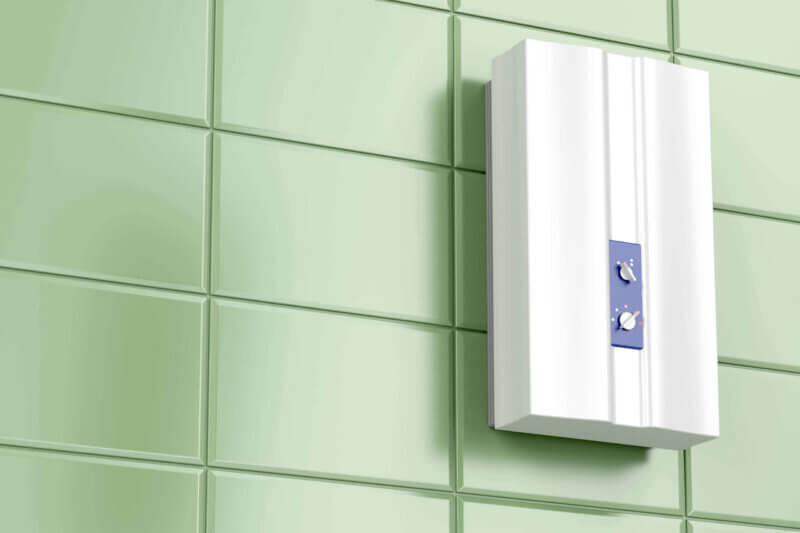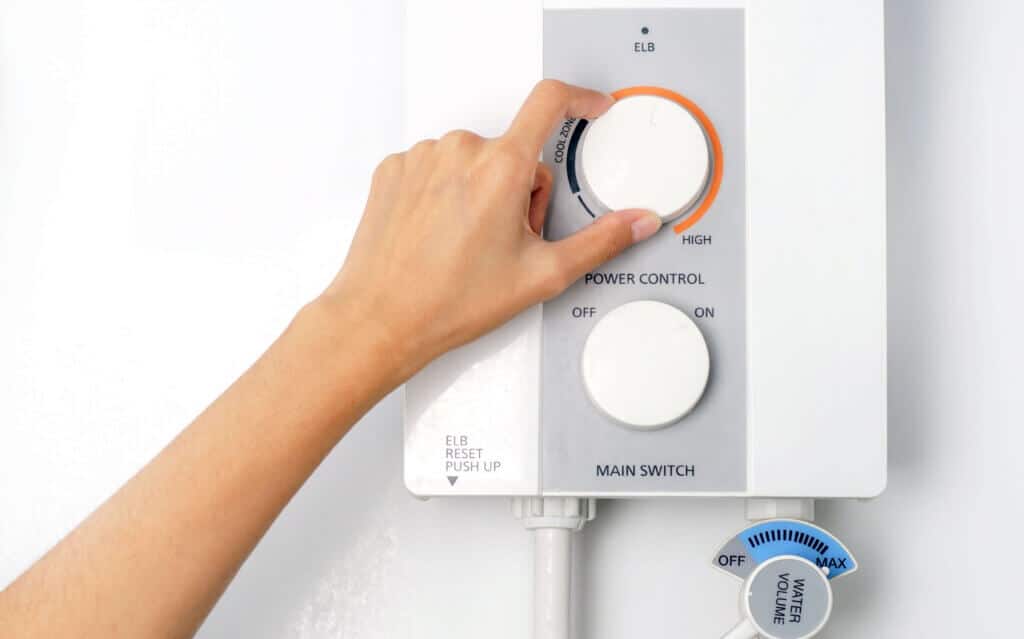
How Does A Tankless Water Heater Work & Are They Worth It?

Hot water heaters are large, bulky appliances. Even a smaller, apartment-sized hot water heater has a pretty significant footprint requiring you to give up valuable closet or garage space to house the appliance.
Traditional hot water heaters need all that space to store the heated water to supply your home or business. That means that downsizing the hot water heater means downsizing your daily hot shower or bath.
That is where the tankless hot water heater enters the arena. In this post, we will dive into how tankless hot water heaters work and if you should consider one for your home or business.
What Are Tankless Hot Water Heaters & How Do They Work?
A standard hot water heater stores hot water in a large tank. A tankless hot water heater creates and transports hot water on demand using a network of small pipes heated by a gas burner or electric coil.
Tankless hot water heaters are much smaller than traditional hot water heaters. They are generally placed in several locations throughout the home or business, essentially creating the hot water where it will be used.
Are Tankless Hot Water Heaters A Good Investment?
Tankless water heaters are affordable and generally offer significant long-term savings over installing and using a traditional hot water heater.
Traditional hot water heaters store heated water for future use. This often leads to quite a bit of heat swap loss as the heated water in the tank cools over time, and the appliance must cycle on to reheat the water while it awaits use.
This constant cycling is inefficient and contributes a substantial amount to home or business energy costs.
On the flip side, tankless hot water heaters are placed near the point of use and use a gas burner or electric coil to heat water on demand and deliver it to the site through a network of heated conduits.
This is a far more efficient process with less water and energy waste. Tankless hot water heaters are estimated to be as much as 50% more efficient than traditional hot water heaters representing hefty savings for home and business owners.
The Advantages Of Tankless Hot Water Heater Installation
In addition to the boost in efficiency and resulting cost savings, there are a few other marked advantages to installing a tankless hot water heater in place of your traditional tank-style hot water heater.
Affordability
First, tankless hot water heaters have become incredibly affordable. Consumers can often purchase a tankless hot water heater for less than the cost of a large traditional water heater.
There is a good reason for this: metal is expensive, and tankless hot water heaters require far less metal to manufacture than large 80-gallon tank-style hot water heaters.
Flexibility
Tankless hot water heaters are compact appliances designed to be placed as close as possible to the site where the hot water will be dispensed. That means that tankless hot water heaters are able to be installed in locations within the home or on properties where a traditional hot water heater might be difficult to place.
Space-Saving
Traditional tank-style hot water heaters often occupy a corner of your garage or laundry room or are housed within a utility closet within your home.
No matter where they are located, they take up a significant chunk of space that could be used for storage or other practical use.
Imagine what you could store in an extra utility closet in your home or how much easier it would be to work in the laundry room or garage if you had use of that extra square footage.
By comparison, a tankless hot water heater takes up very little space. The unit can be mounted on any wall or even placed inside a large cabinet, giving you back the floor space in your home or business.
Is There A Downside To Installing A Tankless Hot Water Heater?
It can’t all be good news. So, what are the downsides of tankless hot water heater installation?
As plumbing professionals, we think tankless hot water heaters are a great option. Still, there are certain factors that you will need to take into consideration before making the switch from a traditional hot water heater to a tankless unit.
Hot Water Volume
Depending on the size of the tank-style hot water heater, these units can store quite a bit of water. This water can be delivered out to multiple faucets and appliances simultaneously at a consistent rate of roughly 7 – 9 gallons per minute.
This means that you can easily run the dishwasher, take a shower, and use the washing machine at the same time with no reduction in water temperature or loss of water pressure.
Of course, when the hot water in the tank is exhausted, you will need to wait another hour or so for the hot water tank to reheat another tankful of hot water.
Tankless hot water heaters do not store hot water. While this means that you will never run out of hot water, your usage will be limited by the ability of the unit to heat water as it flows through the unit and out to your home.
As a general rule of thumb, tankless hot water heaters can produce and distribute hot water at a rate of approximately 2 – 5 gallons per minute.
This slower rate means that attempts to use hot water in multiple areas of the home at once will likely result in a drop in water pressure and temperature.
Initial Cost
The upfront cost of tankless hot water heater installation is often more costly than the cost of installing a standard hot water heater.
However, it should be noted that this initial upfront expense is quickly offset by the extended lifespan, reduced maintenance cost, and greater cost efficiency of the tankless hot water heater over time.
Making The Switch To A Tankless Hot Water Heater
Is your current tank-style hot water heater nearing the end of its useful lifespan? If so, now may be the perfect time to consider making the switch to a modern, energy-efficient tankless hot water heater. These long-lasting, ultra-sleek units are readily available on the market today.
For those located in the Fort Lauderdale area, 4 Star Plumbing Services offers professional tankless water heater installation in Fort Lauderdale and the surrounding areas.
Give us a call at 954-776-9888, or send us a message for a free estimate today. We can’t wait to meet you!
Sean Hasle is a third-generation plumber, serving the South Florida area with his family. He is a licensed plumbing, underground utility, and fire contractor.


